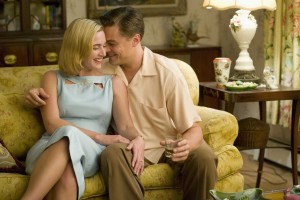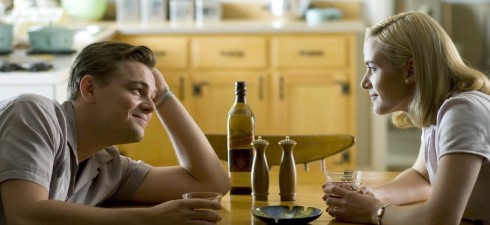This week, Helen tackles the dark heart of suburbia, in Sam Mendes’ Revolutionary Road (2008).
 April is the first to admit to their trapped feeling: “Look at us. We’re just like everyone else. We’ve bought into the same, ridiculous delusion. That we have to resign from life and settle down the moment we have children. And we’ve been punishing each other for it.” She comes up with a plan to move to Paris: she’ll work, while he figures out what he really wants to do with his life. When they tell their friends the good news they don’t really understand. Shep is disturbed by the idea that Frank would be supported by his wife (the film is set on the 1950’s, but has this attitude really changed all that much with the majority of people?). After the Wheelers leave, Millie cries, and I don’t think she’s even sure why. Could it be that she is unhappy with her life too? The only person who seems to understand the Wheelers decision to change their lives is John, a man undergoing treatment at a mental institution. April says, “If being crazy means living life as if it matters, then I don’t mind being completely insane.”
April is the first to admit to their trapped feeling: “Look at us. We’re just like everyone else. We’ve bought into the same, ridiculous delusion. That we have to resign from life and settle down the moment we have children. And we’ve been punishing each other for it.” She comes up with a plan to move to Paris: she’ll work, while he figures out what he really wants to do with his life. When they tell their friends the good news they don’t really understand. Shep is disturbed by the idea that Frank would be supported by his wife (the film is set on the 1950’s, but has this attitude really changed all that much with the majority of people?). After the Wheelers leave, Millie cries, and I don’t think she’s even sure why. Could it be that she is unhappy with her life too? The only person who seems to understand the Wheelers decision to change their lives is John, a man undergoing treatment at a mental institution. April says, “If being crazy means living life as if it matters, then I don’t mind being completely insane.”
Frank tells April that her desire to abort is unnatural and un-womanly, but I don’t think I agree. In today’s world, living in a developed country, contraception is more widely available and more effective (but, of course, never 100%). So how would you feel, if after you’d decided your family was the right size, you found out you were pregnant? Even if actually going through with an abortion was too far down the track for you, do you think it unnatural or un-womanly to want one?
What does it mean to be a woman?

I think the both the novel and the movie do a good job at capturing that mid-life, “is this all there is?” angst, which seems to come to all of us at one time or another. However, and I think this is what makes the novel so scathing, but insighful, I felt that April and Frank are just trading one set of external circumstances that are supposed to bring them happiness — suburban house, two kids — for another set of external circumstances — bohemian life in Paris. In both cases, they are looking for fulfillment outside of themselves and coming back profoundly empty. Suburban houses do not make us secure, living in Paris does not make you more interesting.
As to your question, I really do not judge other women. Being a mother is so difficult and how you do it is very personal. I have to confess that I would be devestated if I found I was pregnant again.
It depends what ails ya. Because external circumstances can and do impact our happiness. The right spouse, the right job, the right house, the right neighborhood… all greatly impact our lives. I’ve seen career changes, location changes, and/or new marriages re-juvenate the lives of many friends. Whose to say “Paris” isn’t the missing ingredient for Frank and April?
(Having said that, the “Paris” solution in the context of this film feels half-baked, more of an elusive dream than a concrete, realistic plan. It’s the fad diet that sounds great, when good, old-fashioned exercise and healthy eating is the real solution.)
But a great, under-appreciated film. Very 70s.
I’m not saying external circumstances don’t impact happiness; to quote Laurie’s other post, “no one has the luxury of escaping their context.” A change of scenery can be good for the soul, as can a new job or a new love affair. But (and I say this as someone who moved to another country on little more than a romantic whim) the problems you had in one relationship or one job usually follow you into the next relationship or next job or next country. One problem is solved, others are created. There is something to blooming where you are planted, but if the soil is too poor for growth, I think it is important to know why, so you can plant yourself in richer soil.
I don’t think the “Paris Solution” is a problem because it is half-baked or elusive (although it is), I think it is a problem because Frank and April (well, at least April) aren’t sure what they are looking for. They have built their sense of self on feeling smarter, hipper, or more alive than their friends and then find at a certain point that they aren’t. I’m not sure a scenery change can fix that.
This is actually something I think about a lot. My husband and I have left the security of being close to family and friends and built a life where my children have been exposed to amazing things. But there is still the laundry and cleaning the toilet and watching television.
I think what makes Paris so exciting for April (and me) is the idea of being able to go out to work, and be a mother. I’m not sure if that is an option for her where they live. Women do work in Frank’s office, but I get the impression they are single women. You could see from the reaction of those they told of their idea that no-one thought it right that April should go to work, and Frank be supported by her, I don’t think it was necessarily the move to Paris that shocked them so much. Of course, there will still be problems, there always is, but different problems may be easier to cope with. April obviously couldn’t cope with her current problems.
Helen, that is a very good point. I think working outside the home is so far out of the realm of April’s day to day life that she can only concieve of doing it in an exotic location where everything is different. In fact, she is the driving force behind the move and I felt that she was trying to fulfill her desire for more through Frank. As the movie/film goes on, it becomes clear that Frank is more content to stay where he is.
I agree Heidi – I think that April is the one that wants to make the move, but I feel like she tries to convince Frank that it’s for him too, so that he’ll go along with it. When she remembers the conversation they had once about Paris and how much he loved it, I think she gets the idea that maybe she can convince him that this is his dream too. Maybe she doesn’t even realise herself how much she wants the move for herself until her dreams are dashed by her pregnancy.
Though I would like another child, my wife does not. I think I would find it very difficult to accept my wife’s decision to have an abortion. However, this probably emerges from an uncritical approach to my upbringing as a Mormon. Being a woman in this context could be fruitfulyl explored through Judith Butler’s reading of Plato in ‘Bodies that Matter’. It seems that woman is a background, a form that provides the creative space for masculinity to flourish. I see April’s awkward references to the greatness of masculinity and her willingness to back that up through an abortion as the sacrificial logic of this form of femininity pushed to its limit.
This is one in a trio of films that really made me question whether I wanted the “settled down life.” (the others are Last Kiss and Up in the Air). All of them touch of this “mid-life angst” that Heidi describes, and that trapped feeling is something I consciously try to escape — for better or worse.
There certainly are trade-offs. In the film, the family had a dream to start fresh in Paris and get away from the suffocation. But they also didn’t fully appreciate the benefits the suburban life gave them.
At the end of the day, I just know that being an adult is hard.
I would never want to have to make that choice, because I don’t feel that abortions are as safe as they could be. I really don’t know much about the whole process but everything seems very cloak and dagger regarding getting the procedure done. Because it’s such a charged and opaque subject, I don’t think the technology to do it is where it could be if we as a society were more open and free with it. I just wouldn’t feel safe.
However, I think abortion is a noble thing if the mother wants it. My husband got a vasectomy a couple years ago so hopefully this is not an issue that would come up. If it did, however, I would have to do the noble thing and get an abortion. I owe it to myself and to the children I have now not to willingly take on another burden I couldn’t handle.
This movie got into my head like few others.
My family is done and I cannot even find a word to describe how I would feel if I were to get pregnant again. Heidi said “desperate.” Yep. But somehow that doesn’t quite capture it for me. Perhaps “deranged lunatic” is closer??
I don’t mean to sound cavalier because it is a very serious topic. Being a smart aleck is just my way of dealing with it. I think about it ALL THE TIME. I was travelling last week and so had an opportunity to see lots more people and strangers than I usually do in airports, at two conferences I attended, and on busy city streets. Every time I saw a pregnant woman, my heart skipped a few beats–as if it were something I could catch?? It’s mental.
I know what you mean Heather.
Hmm, funny how the things that struck me about the movie, her pregnancy & abortion were the least of them. I was equally repulsed by their affairs and selfishness. I didn’t care for either of the characters because they were wholly arrogant and immature. While I think all of us can understand the feelings going on, even felt the very same, their responses and choices as a result turned me completely off. I cannot even IMAGINE having another kid, the reason why I pretty much forced my husband to have a vasectomy about a year ago. But dammit, take the bad and the tough and make yourself a better person.